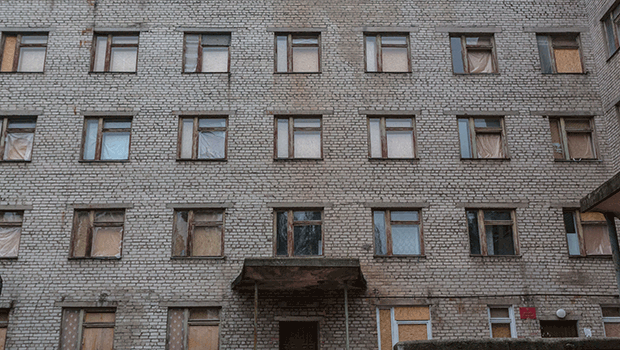She was in a hurry when we spoke to her. “Five minutes please!”, she said, because she needed to attend to her patients. In September, we were in Eastern Ukraine to look at the impact of explosive weapons on health care. The Avdiivka hospital was one of the locations we visited, and the nurse was one of many health workers who shared their experience with us.
Candlelight
In 2014, she was on a shift when shelling started and she started carrying patients down to the basement. She heard an explosion, and immediately felt a hot sensation in her legs and stomach. Pieces of shrapnel had pierced her body in several places. Her colleagues performed surgery on her, in her own hospital, by candlelight. Because of the shelling, there was no electricity. She showed us where she still had a piece of shrapnel in her body – the doctors must have missed it in the candlelight. When she had recovered, she started taking care of patients again, even thought there was no water, no electricity, no heating, and the hospital was still at risk of being shelled. She wants peace, she said, and then returned to attending her patients.
This nurse is not the only one. When explosive weapons are used in populated areas, the chances are high that civilians will be hit. Explosive weapons with a wide area effect are especially problematic because of the risk they pose to civilians. Explosive weapons have a wide area effect when they meet a few conditions: when they have a large destruction radius because they contain a large high explosive load (heavy aircraft bombs for example); when the delivery system is inaccurate (for example weapons that fire indirectly such as mortars); and when multiple munitions are delivered over a wide area (for example multiple launch rocket systems such as the GRAD, often used in Ukraine). According to the British NGO AOAV, nine out of ten casualties from explosive weapons in populated areas are civilians. Moreover, critical infrastructure upon which civilians depend (water supplies, power plants, gas pipelines, and telephone lines, among others) is at risk of being destroyed. Civilian objects, such as houses, schools and hospitals, run a big risk of getting hit, as well. In this case, using heavy artillery in the town of Avdiivka resulted the hospital getting hit.
Hell in Avdiivka again
Since Sunday, the conflict has intensified again in Eastern Ukraine. Yesterday, I received an email from our local contact who took us to Avdiivka in 2016. “There’s a hell in Avdiivka now. The hospital got shelled again.”
Although I haven’t been able to confirm whether the hospital indeed was hit or not in the latest fighting, I think about the nurse and her patients, about the fact that reportedly thousands of people are without water and electricity once again. What this will mean for patients, who might again need to be treated under candlelight, that equipment cannot be sanitized because of lack of water, and what this will mean for the people who again will live in fear of the shelling. I think about the fact that, even in the hospital, civilians in Avdiivka are not safe from the impact of explosive weapons. I hope that the shelling in Avdiivka will stop. That peace will come. That we, the outside world, will not forget about the people there.
We need to stay alert and active, and challenge our acceptance of the fact that civilians, and buildings used by civilians such as hospitals, are not safe during a conflict. We cannot accept that the Minsk agreement continues to be violated and that civilians are stuck in the middle. We need to protect civilians from the effects of war, and we need to keep tracking what happens when they aren’t.
Explosive weapons with a wide area effect should not be used in towns and cities because of the humanitarian impact they have. Avdiivka, January 2017, unfortunately shows us, yet again, exactly what that is like.
Read more about our thematic work on explosive weapons in populated areas.
Read more information about our work in Ukraine.




